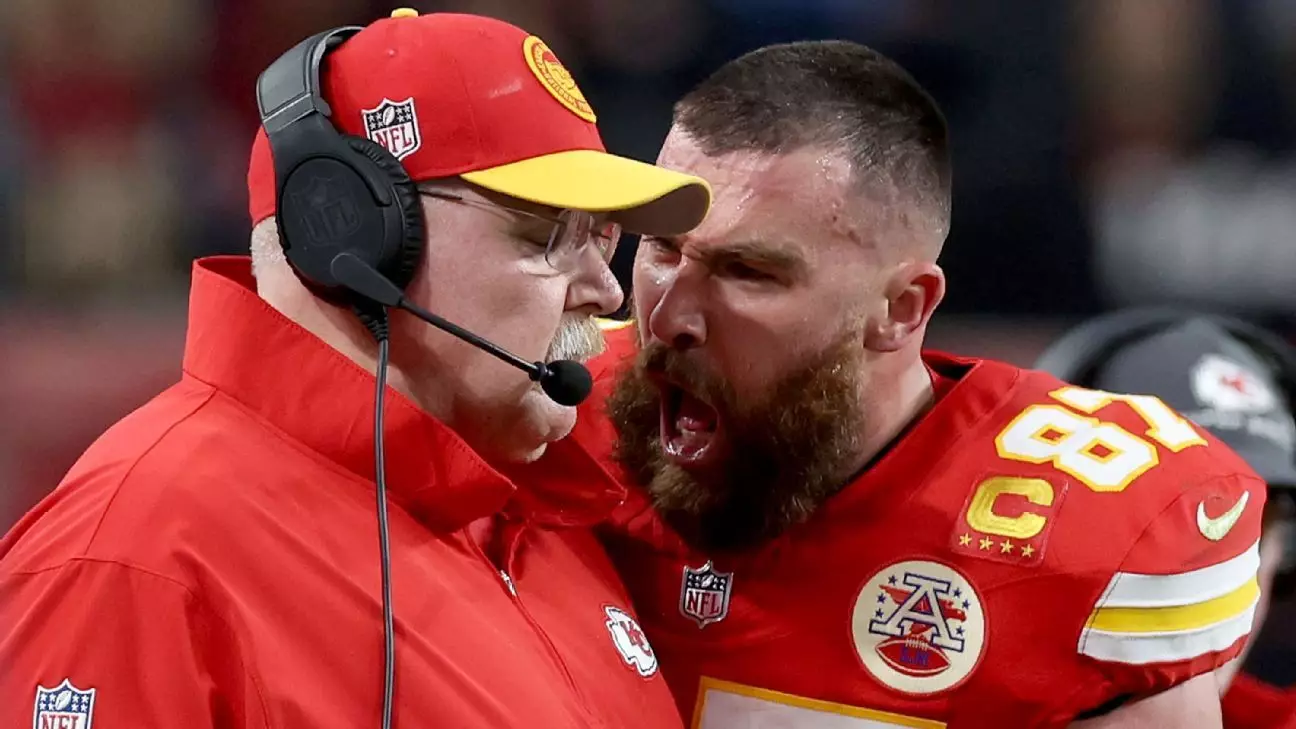The actions of Kansas City Chiefs tight end, Travis Kelce, during Super Bowl LVIII have sparked controversy and raised questions about his behavior on the field. On their podcast, “New Heights,” Kelce’s brother, Jason Kelce, openly criticized Travis for his confrontation with coach Andy Reid, calling it unacceptable. In response to the backlash, Travis Kelce admitted his mistake and expressed his regret for his actions. This incident has shed light on the emotional side of professional athletes and the challenges they face in managing their emotions in high-pressure situations.
Travis Kelce acknowledged that he had crossed a line by bumping into Coach Reid and screaming in his face during the game. He recognized the impact of his actions, admitting that it threw Reid off balance and disrupted the team’s dynamics. Demonstrating his growth and self-awareness, Kelce acknowledged that he allowed his emotions to get the best of him on that occasion. It takes courage to admit a mistake publicly, especially on such a prominent stage like the Super Bowl.
Despite the intensity of the altercation, Travis Kelce expressed his deep admiration for Coach Reid. He emphasized the strong relationship he shares with Reid and how the coach has been instrumental in his personal and professional development. Kelce acknowledged that Reid had held him accountable in the past, and in that moment, he wanted to convey his commitment to winning. However, Kelce recognized that there were healthier ways to express his passion and acknowledged the negative perception it may have created.
Following the incident, Travis Kelce had a conversation with Coach Reid to address the situation. Surprisingly, Reid did not berate or scold Kelce but instead reassured him that his passion was appreciated. Reid acknowledged the challenges of being under constant scrutiny and encouraged Kelce to be mindful of his actions, as they could be misinterpreted. This response served as a reminder of the strong bond between Kelce and Reid, emphasizing their mutual desire to succeed.
Travis Kelce expressed immediate regret for his actions, wishing he could take them back. It was evident that he was disappointed in himself for allowing his emotions to overshadow his better judgment. However, Kelce found solace in knowing that Reid understood his intentions and did not hold it against him. This incident acted as a catalyst for Kelce to channel his passion into delivering a victory for Reid, further reinforcing the depth of their relationship.
Coach Reid stood by Travis Kelce, appreciating his passion and dismissing the severity of the physical contact during the altercation. His response showcased his understanding of the emotions that players experience and the context of the intense Super Bowl environment. By expressing his support for Kelce, Reid demonstrated that he values his players’ commitment and recognizes the challenges they face on the field.
The incident involving Travis Kelce serves as a reminder of the emotional nature of professional sports. It highlights the pressure athletes face and the difficulty of managing one’s emotions in high-stakes situations. Kelce’s willingness to acknowledge his mistake and engage in open dialogue demonstrates personal growth and a commitment to self-improvement. This incident also sheds light on the importance of effective communication and understanding between players and coaches, as well as the impact of a supportive coaching environment.
Moving forward, Travis Kelce vowed to learn from this incident and strive to handle his emotions more effectively. He understands the importance of setting a positive example for his teammates and the impact his actions can have on the team’s dynamics. The incident has not only created an opportunity for self-reflection but has also brought the team closer together in their pursuit of success.
Travis Kelce’s confrontation with Coach Andy Reid during Super Bowl LVIII has sparked controversy and raised questions about the behavior of professional athletes. However, Kelce’s willingness to acknowledge his mistake, express his admiration for Reid, and engage in a candid conversation demonstrates personal growth and a commitment to self-improvement. This incident serves as a reminder of the emotional nature of sports and the challenges athletes face in managing their emotions. Ultimately, it is through learning from such experiences that athletes like Kelce can evolve into better leaders and contributors to their teams.


Leave a Reply